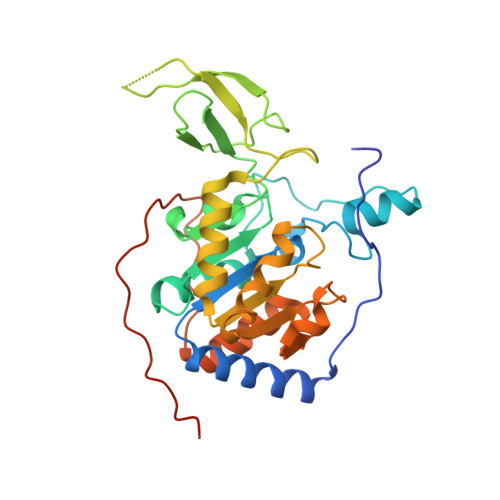Structural Basis of Sirtuin 6 Activation by Synthetic Small Molecules.
You, W., Rotili, D., Li, T.M., Kambach, C., Meleshin, M., Schutkowski, M., Chua, K.F., Mai, A., Steegborn, C.(2017) Angew Chem Int Ed Engl 56: 1007-1011
- PubMed: 27990725
- DOI: https://doi.org/10.1002/anie.201610082
- Primary Citation of Related Structures:
5MF6, 5MFP, 5MFZ, 5MGN - PubMed Abstract:
Sirtuins are protein deacylases regulating metabolism and stress responses, and are implicated in aging-related diseases. Small molecule activators for the human sirtuins Sirt1-7 are sought as chemical tools and potential therapeutics, such as for cancer. Activators are available for Sirt1 and exploit its unique N-terminus, whereas drug-like activators for Sirt2-7 are lacking. We synthesized and screened pyrrolo[1,2-a]quinoxaline derivatives, yielding the first synthetic Sirt6 activators. Biochemical assays show direct, substrate-independent compound binding to the Sirt6 catalytic core and potent activation of Sirt6-dependent deacetylation of peptide substrates and complete nucleosomes. Crystal structures of Sirt6/activator complexes reveal that the compounds bind to a Sirt6-specific acyl channel pocket and identify key interactions. Our results establish potent Sirt6 activation with small molecules and provide a structural basis for further development of Sirt6 activators as tools and therapeutics.
Organizational Affiliation:
Universität Bayreuth, Lehrstuhl Biochemie und Forschungszentrum für Biomakromoleküle, Universitätsstr. 30, 95447, Bayreuth, Germany.



















